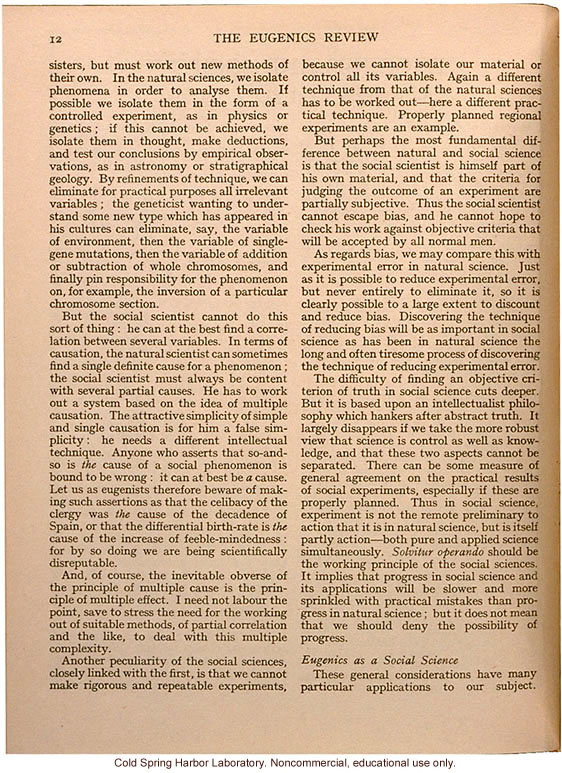"Eugenics and Society" (The Galton Lecture given to the Eugenics Society), by Julian S. Huxley, Eugenics Review (vol 28:1) (1)

"Eugenics and Society" (The Galton Lecture given to the Eugenics Society), by Julian S. Huxley, Eugenics Review (vol 28:1) (1)
1824. 12 The Eugenics Review sisters, but must work out new methods of their own. In the natural sciences, we isolate phenomena in order to analyse them. If possible we isolate them in the form of a controlled experiment, as in physics or genetics; if this cannot be achieved, we isolate them in thought, make deductions, and test our conclusions by empirical observations, as in astronomy or stratigraphical geology. By refinements of technique, we can eliminate for practical purposes all irrelevant variables; the geneticist wanting to understand some new type which has appeared in his cultures can eliminate, say, the variable of environment, then the variable of addition or subtraction of chromosomes, and finally pin responsibility for phenomenon on, for example, the inversion of a particular chromosome section. But the social scientist cannot do this sort of thing; he can at the best find a correlation between several variables. In terms of causation, the natural scientist can sometimes find a single definite cause for a phenomenon; the social scientist must always be content with several partial causes. He has to work out a system based on the idea of multiple causation. The attractive simplicity of simple and single causation is for him a false simplicity: he needs a different intellectual technique. Anyone who asserts that so-and-so is [italics]the[end italics] cause of a social phenomenon is bound to be wrong: it can at best be [italics]a[end italics] cause. Let us as eugenists therefore beware of making such assertions as that the celibacy of the clergy was [italics]the[end italics] cause of the decadence of Spain, or that the differential birth-rate is [italics]the[end italics] cause of the increase of feeble-mindedness: for by so doing we are being scientifically disrepuatable. And, of course, the inevitable obverse of the principle of multiple cause is the principle of multiple effect. I need not labour the point, save to stress the need for the working out of suitable methods, of partial correlation and the like, to deal with this multiple complexity. Another peculiarity of the social sciences, closely linked with the first, is that we cannot make rigorous and repeatable experiments, because we cannot isolate our material or control all its variables. Again a different technique from that of the natural sciences has to be worked out -- here a different practical technique. Properly planned regional experiments are an example. But perhaps the most fundamental difference between natural and social science is that the social scientist is himself part of his own material, and that the criteria for judging the outcome of an experiment are partially subjective. Thus the social scientist cannot escape bias, and he cannot hope to check his work against objective criteria that will be accepted by all normal men. As regards bias, we may compare this with experimental error in natural science. Just as it is possible to reduce experimental error, but never entirely to eliminate it, so it is clearly possible to a large extent to discount and reduce bias. Discovering a technique of reducing bias will be as important in social science as has been in natural science the long and often tiresome process of discovering the technique of reducing experimental error. The difficulty of finding an objective criterion of truth in social science cuts deeper. But it is based upon an intellectualist philosophy which hankers after abstract truth. It largely disappears if we take the more robust view that science is control as well as knowledge, and that these two aspects cannot be separated. There can be some measure of general agreement on the practical results of social experiments, especially if these are properly planned. This in social science, experiment is not the remote preliminary to action that it is in natural science, but is itself partly action -- both pure and applied science simultaneously. [italics]Solvitur operando[end italics] should be the working principle of the social sciences. It implies that progress in social science and its applications will be slower and more sprinkled with practical mistakes than progress in natural science; but it does not mean that we should deny the possibility of progress. [italics]Eugenics as a Social Science[end italics] These general considerations have many particular applications to our subject. [end]
- ID: 11739
- Source: DNALC.EA


